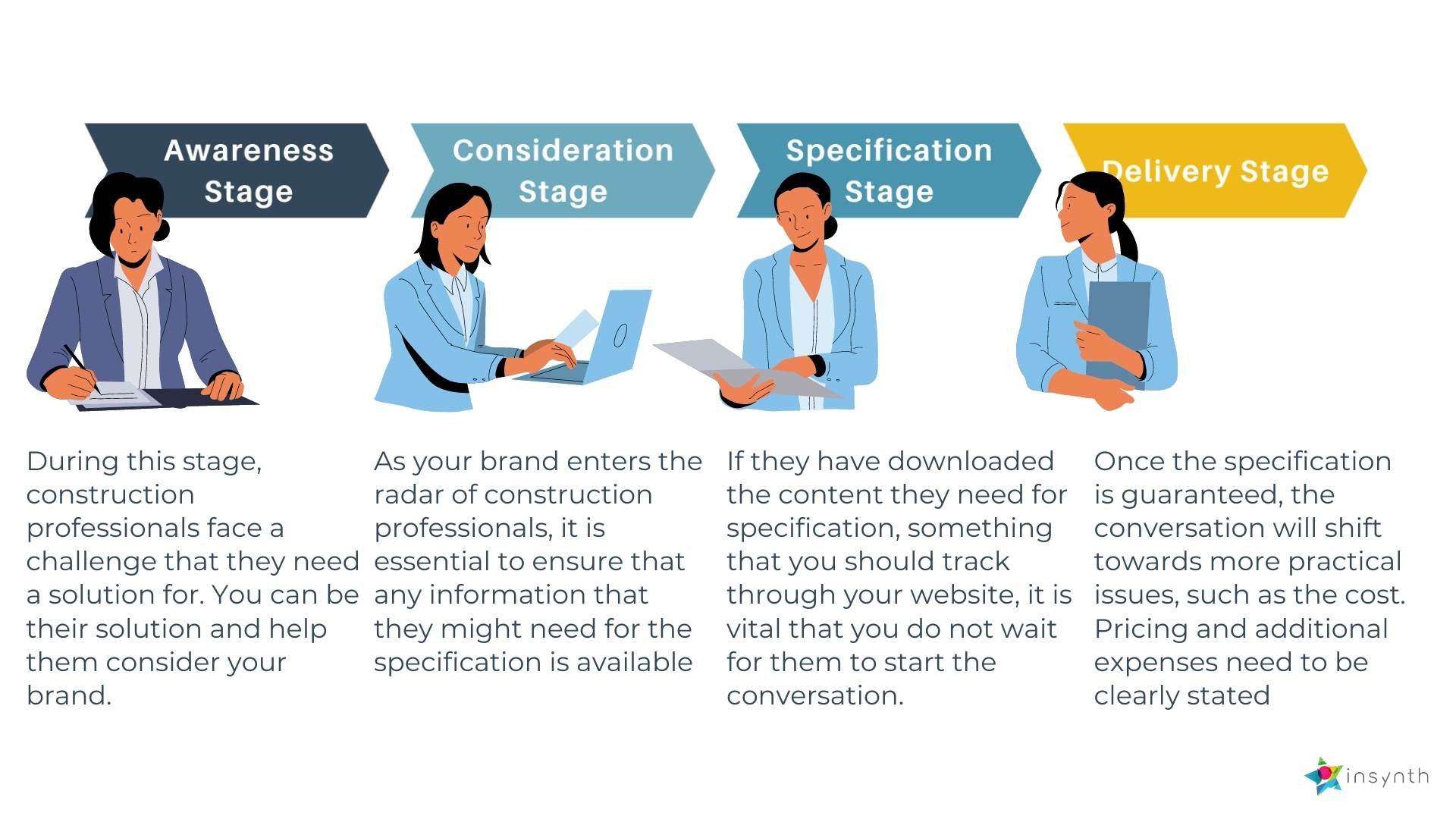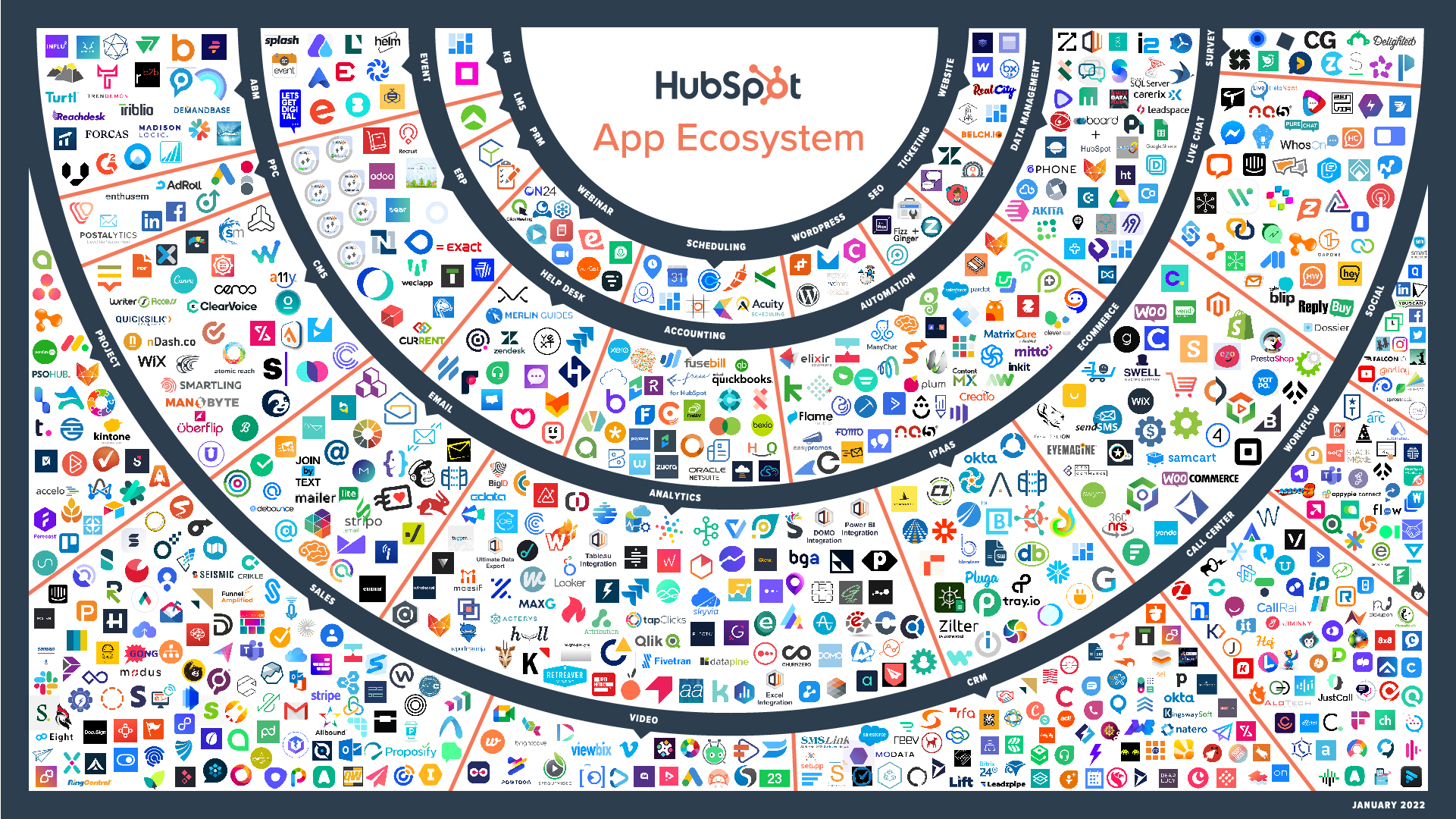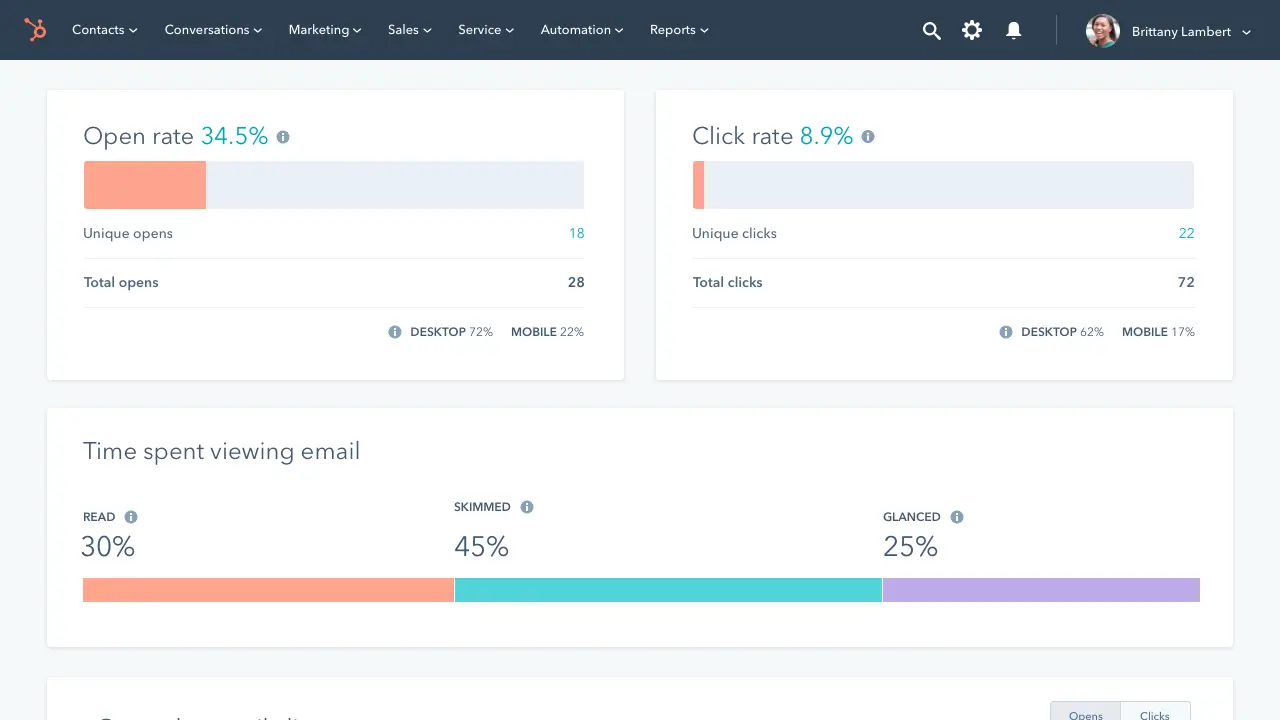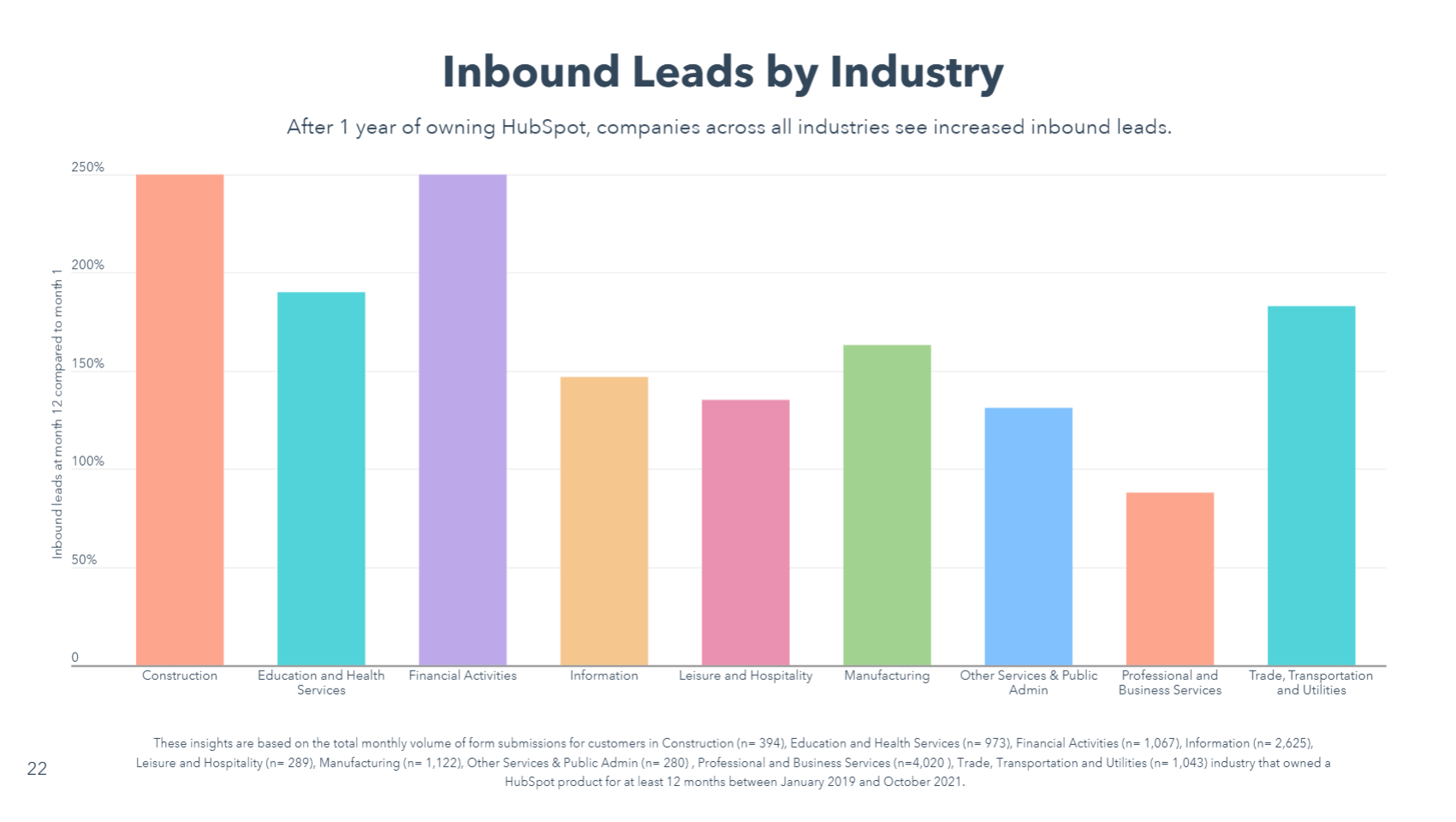
HubSpot has been implemented in more than 143,000 businesses in over 120 countries. It comes as no surprise that it has become one of the most popular CRM-based marketing, sales, services, and operations platform in the last ten years. A quick search in Google will take you to numerous success stories where you can see the huge impact swapping to HubSpot can have for your building product brand but, the real question is, is HubSpot really worth it?
In this blog post, we speak about why HubSpot is different to other CRMs in the market, explaining the basics of the inbound methodology and how it can be applied to building product brands. We also go over the different people that the platform has thought about when designing its features and the cost implementing them could entail. Lastly, we reveal the results construction companies experienced one year after adopting HubSpot.
HubSpot is one of a kind
Unlike any other CRM-based platform, HubSpot is inbound-driven. Inbound is a customer-centric philosophy that understands the customer as the axis around which any business should rotate. Actively listening to and understanding your customers remains at the base of this methodology and allows businesses to shape and optimise their marketing, sales, service, and operation strategies to better suit the needs of their customers or, in the case of building product brands, of their specifiers.
The specification is, in fact, a process that has significantly changed, and inbound has been able to recognise that switch. Inbound is changing the way building product brands operate, and it's proposing questions you probably haven't thought about before. According to the inbound methodology, before making a purchase or hiring a service, any prospect goes through three distinct stages: an awareness stage, a consideration stage, and a decision stage.

For building product brands, we add an extra stage, the delivery stage, focusing on supporting the specifier as your building solution is installed. As such, specifiers go through four phases in their specification process, including an awareness, a consideration, a specification, and a delivery phase. Recognising these phases and using a CRM that allows you to segment your audience accordingly can be a real game-changer.
Inbound works because it focuses on meeting people on their own terms and interacting with them using the sites, platforms, and networks they value most. This approach encourages professionals to do business in a human way and create meaningful 1:1 relationships with strangers, prospects, or customers. Inbound is a better way to market, a better way to sell, and a better way to help your customers and your building product brand.
Is HubSpot Right for Building Product Brands?
To be an inbound business, you need to have a system in place. This means aligning your marketing, sales, and services teams around providing outstanding service in their content, conversations, and interactions. Having a defined framework for aligning your teams and their goals can help ensure that everyone, from every executive to every individual contributor, is spending their time and effort working toward the same end.
A question that is always in the back of the minds of construction professionals is whether they are doing enough to guarantee the success of their brand. When asked about their day-to-day challenges, construction leaders seek tools to help achieve that growth. 55% want more access to real-time information, whilst 70% believe faster data could help their performance. But is HubSpot really the CRM for building product brands?

HubSpot Is Designed for Business Owners
A significant part of the day of any business owner is lost in tedious admin tasks that do not allow them to think about the wider picture of their business and how new strategies can help the growth of their building product brand. Keeping up with every single detail within your business can be frustrating and sometimes, impossible. HubSpot allows you to manage your activities, and organise and respond to all your customer support issues, all with the same tool.
HubSpot Is Designed for Sales Leaders
There is no looking back. Gone are the days when sales leaders relied on outdated and inaccurate data. HubSpot is designed with sales teams in mind, allowing them to get real-time data of their entire sales pipeline on an easy-to-use and intuitive dashboard. HubSpot also enables sales teams to log and report on their sales activities, their productivity, and both their team and individual performance, helping them invest resources where they are most needed.

HubSpot Is Designed for Operations Teams
With over one hundred integrations developed in-house and even more developed by third parties, HubSpot is the CRM platform with the widest software ecosystem in the market. This means that your HubSpot portal can be connected to most of the tools that your current tech stack includes, helping your business stay connected and allowing you to make even more out of the tools and apps you use in your day-to-day.
.png)
HubSpot Is Designed for Customer Service Teams
Recognising the importance of that delivery stage that we mentioned at the beginning of the post, it is crucial for building product brands to excel in all their customer interactions throughout the specification process. For that HubSpot includes a universal inbox, providing users with a centralised inbox that any member of the team can access, guaranteeing a timely and consistent follow-up with the prospect.

HubSpot Is Designed for Marketers
Born as a marketing platform, HubSpot has gone a long way to ensure that it is regarded as a holistic platform. This has not, nevertheless, led HubSpot to forget about marketers and their needs, designing one of the strongest and most popular CRM-based marketing platforms. Quickly becoming every marketer’s best friend, HubSpot will automatically organize, enrich, and track each contact in a tidy timeline.
How Much Does HubSpot Cost?
Well, it depends. Taking into account the features that you need to leverage the growth of your building product brand, the answer could be simply nothing. The key to HubSpot is that its platform is fully scalable, allowing users to start with a small package to then upgrade once they have been able to prove the value of the software. You can even combine different Hubs of different tiers to create a bespoke bundle that does exactly what you want.
HubSpot Free Tools
Indeed, HubSpot has a free version that might be enough for small businesses to start their journey. These free tools include limited versions of paid products that are embedded in a CRM and that can help you start organising your database. Most free users go into HubSpot to start learning about the inbound methodology and, once they are familiar with the features, vocabulary, and layout of the platform, they start investing in their tech stack.
No catch, HubSpot’s free tools are, simply, free.
HubSpot Starter
Small-size businesses with a limited budget might decide to start their journey with a low-investment option that allows them to use powerful features such as segmentation lists, forms, CTAs, landing pages, and live chat, to start analysing their audience and establishing patterns. Once their awareness of their audience is satisfactory, users tend to upgrade their package to benefit from automation and HubSpot’s IA.
The base price of HubSpot’s Starter Hubs is £17 per month.
HubSpot Professional
Professional Hubs are meant for teams that require a CRM powerful enough to help them scale. These Hubs offer accurate and real-time information that can be used in sophisticated reports and automated processes. The main goal of the HubSpot Professional is to enable scaling teams to optimise, accelerate, and forecast without compromising the usability of their software and the comfort of the team.
The base price of HubSpot’s Professional Hubs is of £330/month.
HubSpot Enterprise
The Enterprise tier of HubSpot is for sophisticated businesses that are keen to increase their efficiency without adding complexity to their processes. Considered the most powerful set of CRM software, HubSpot Enterprise provides users with tools that allow them to boost their productivity, shorten their deal cycles, and improve the overall experience of their customers. Its powerful data-collection capability helps businesses eliminate friction and bring the team together.
The base price of HubSpot’s Enterprise Hubs is of £990/month.
Is HubSpot Worth The Investment?
The value that HubSpot can add to your building product brand will depend on your current challenges and goals. Yet, the proven track record of this platform can help you decide whether you want to take that step and start actively investing in your CRM software.
But you don't have to take my word for it, here are the facts.
In 2021, HubSpot analysed data from over 100,000 HubSpot users to determine the ROI they obtained after implementing the platform. One year after adopting HubSpot, users working within the construction industry experienced a 113% increase in website traffic, leading to a 288% increase in inbound leads. Construction-specific HubSpot users also saw, on average, an 83% increase in deals closed-won and an increase of 75% in their close deal rate.

HubSpot also observed that the ROI of the platform increased when different Hubs were used in combination. For example, by combining Marketing Hub and CMS Hub, customers see even greater improvement in website traffic over time. Similarly, the Marketing, Sales, Service, and CMS Hub bundle outperformed Sales Hub alone and other bundles for improvement in deals closed-won one year after purchase.
These numbers clearly reflect that for building product brands, investing in a platform like HubSpot can lead to remarkable growth and success, helping them achieve their goals more efficiently. HubSpot has created an ROI calculator for anyone to see what implementing HubSpot could mean for their company, using your own building product brand’s statistics to produce a calculation of the projected ROI of adopting this platform.
Do You Already Use HubSpot But It Has Not Quite Worked For You?
Whilst a great platform will help you discover new features, it is important to learn how to use it. A good car sounds brilliant but only if you know how to drive it! If you are looking at adopting HubSpot or you have done it in the past without success, it is important for you to know that you do not need to do this alone. Having the support of an inbound-specialised construction marketing agency is essential to guarantee that the platform you are investing in is the right one0.
When considering different agencies, it is key that they prove their knowledge of the inbound methodology. As mentioned before, inbound might seem straightforward, almost driven by common sense but, if not done properly, it could lead to resources being wasted. As HubSpot Partners, we have experience and expertise in deploying HubSpot and other CRM systems into a wide range of businesses.
Supporting over a dozen companies implementing HubSpot, we will support you in setting up your CRM, configuring your deal stages, integrating with email inboxes for email tracking, data cleansing, deduplicating and data testing pre-migration, integrating with third-party systems and more. Numerous technical steps need to be performed to realise the full benefits of such a powerful system, and we have your back for all of them so that you can get up and running quickly.
What are you waiting for?
About Insynth
At Insynth we deliver a predictable flow of leads, customers, and specifications for building product brands through our inbound marketing approach, proven to reach a technically demanding audience.
We use the latest marketing techniques such as construction inbound marketing, to equip building product companies to grow sustainability in this era of digital transformation.
As the only HubSpot certified agency to major in construction marketing. We have a proven formula of bringing a variety of functionalities together including CRM Implementation, Web Design, Sales Automation, SEO, and Email Marketing to achieve your ultimate aim: Growing your business and gaining new specifiers and customers.

